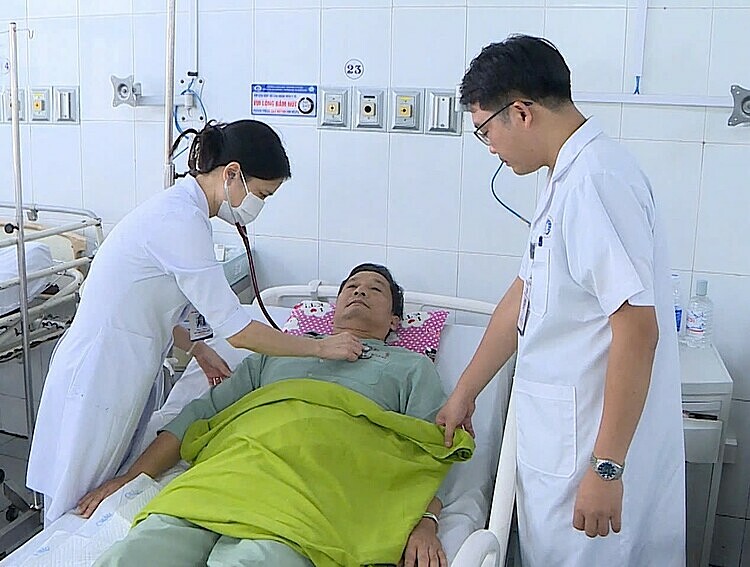On 13/8, Phu Tho General Hospital reported on a 52-year-old patient with a history of hypertension who was undergoing daily medication. Two hours prior to admission, he experienced sudden chest pain and shortness of breath. After examination, doctors diagnosed acute myocardial infarction due to hypertension and transferred him to the Cardiac Catheterization Unit. However, while en route to the unit, the patient's condition deteriorated rapidly, resulting in cardiac and respiratory arrest.
The hospital's emergency response system was immediately activated. The medical team performed cardiopulmonary resuscitation, persistently administering CPR as they moved the patient along the corridor to the emergency room. After nearly two hours, 15 electric shocks, and continuous chest compressions, the patient's heartbeat was restored. Despite this, his condition remained critical, with the risk of another cardiac arrest at any moment. The team immediately transferred him to the Cardiac Catheterization Unit to reopen the blocked coronary artery.
 |
Doctors examine the patient. Photo: Hospital provided |
Due to the prolonged circulatory arrest, the patient experienced multiple organ failure and arrhythmia. After the catheterization procedure, he was transferred to the Intensive Care Unit for specialized monitoring and treatment. There, the team employed various intensive care methods, including sedation, induced hypothermia, mechanical ventilation, continuous renal replacement therapy, hemoperfusion, and PICCO hemodynamic monitoring. Thanks to these measures, his condition gradually improved.
After 10 days of treatment, the patient was weaned off the ventilator, fully conscious, and without neurological damage. His hemodynamic parameters, cardiac function, and other organ functions gradually returned to normal.
Doctor Nguyen Van Son, Head of the Cardiac Catheterization Unit, stated that cardiac arrest due to acute myocardial infarction is a severe complication with a high mortality rate. Without prompt intervention, approximately 25% of patients may die within the first few minutes, and only about 10% have a chance of survival. Typically, in cases of circulatory arrest during myocardial infarction, if the heartbeat isn't restored within the first few minutes, the survival rate is very low.
"A case with nearly two hours of continuous CPR is exceptionally rare in clinical practice," he said.
Doctor Son added that this case presented a significant technical challenge, requiring effective CPR, coordinated electric shocks, and precise administration of emergency medication. It also demanded unwavering persistence and resilience from the entire medical team throughout the prolonged procedure.
Thuy Quynh












